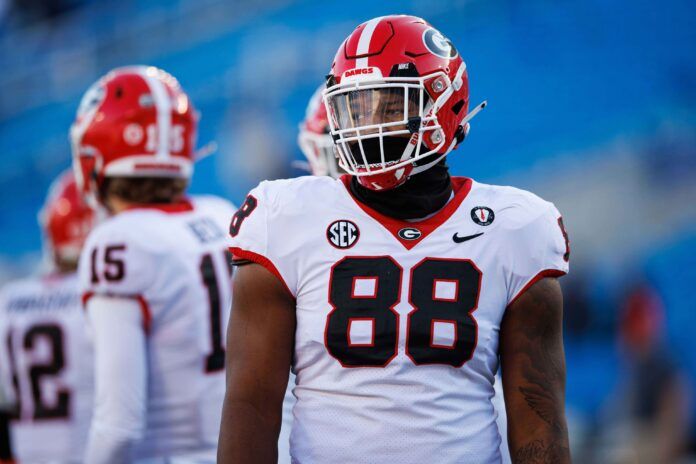The NFL Combine discussion was dominated by the news that police in Georgia issued an arrest warrant for Georgia prospect Jalen Carter, who police described as one of the potential drivers of one of the cars driving alongside the car carrying recruiting coordinator Chandler LeCroy and sophomore Devin Willock.
The cars, according to the police, appeared to be racing. The police also described a third car, also driven by a Georgia player, but they did not indicate who that was.
Draft Discussion Dominated the Conversation About Jalen Carter’s Arrest
The harsh reality of the NFL draft is that every rumor or piece of news about a player — no matter how personal, private, tragic, or even uplifting — will veer toward a conversation about player value and draft stock. It’s impossible to ignore the bare market logic that a judgment will be made on April 27 about a player’s ultimate value, and the inevitability of that conclusion drives discussion.
That’s particularly true at the NFL Combine, an event designed to further evaluate college prospects for their suitability in the NFL draft.
And so, we ask.
Chris Grier, the general manager of the Dolphins, gave a statement virtually indistinguishable from the other coaches and general managers across the league: “I really can’t comment on it because I don’t really know about it.” He added, “It’s a situation that if I don’t know anything like that, I don’t really want to comment.”
Eric DeCosta, the general manager for the Ravens, said the same thing. “First of all, that was a horrible tragedy. Let me say that,” he started out. “Secondly, I don’t know a whole lot about the situation. When these things come, I’m like you guys. I don’t really know. I wouldn’t want to comment on the specifics about how that would affect somebody’s draft status because there’s a lot more information, and I’m not privy to that.”
DeMeco Ryans, head coach of the Texans, echoed the sentiment — he prioritized the feelings of those affected, including the families, then added that he didn’t know any details.
Every general manager and coach on record reiterated similar sentiments: They didn’t know any details, they felt for all of those affected, and they would, if possible, learn details later. As DeCosta said at the end of his comments — he doesn’t know the details, but he “might by the time the draft rolls around.”
Meanwhile, journalists, analysts, and scouts on the ground discussed the wide range of outcomes at hand, all in relation to Carter’s draft stock. Those with an investment in public prognostication debated what to do about projecting Carter’s eventual landing spot.
Jalen Carter’s Arrest Demonstrated Why the Draft Process Is Impersonal
This process, which turns players into assets, demands a degree of certainty that is always impossible but particularly so following breaking news. Whether Carter will be exonerated, like he claims he will be, or his charges potentially escalate beyond two misdemeanors is unknown.
It seems likely that he could even plea down his charges — a situation that might raise some moral or practical questions but provides a degree of certainty for potential general managers.
When the dust settles, most teams will evaluate the process clinically. The fact that multiple people passed away is tragic, but the process will demand two essential questions of teams: first, whether they think Carter will miss any time in the short term, and second, whether they think Carter will do something that jeopardizes his availability in the future.
That may come down to Carter’s public presence from here on out, in addition to his behavior in interviews with teams. One element that can’t be ignored is that Carter initially misled police regarding his whereabouts in the aftermath of the collision.
It also cannot be ignored that a young player found himself immediately dealing with the consequences of trauma — which may have informed his immediate response — and will do so for perhaps the rest of his life.
How teams interpret that behavior will be up to them, but it will always be with an eye toward team-building and liability. This process was not designed to accommodate the rehabilitation or reflection of a person who may have made a tragic mistake. The best it can do is make room for it in its quest to create a perfect team.
Certainly, Carter will find himself in a much better situation if he lands on a team with a coaching staff that will prioritize his needs as a human being — both because it will help him grow from whatever happened that night but also because it will be in the best interest of the team. The concern is what happens when those two goals don’t align.
This might raise important institutional questions — like whether this intersects with a change in the state’s open records law that protects the athletic programs from public information requests for 90 days instead of three days — or whether there has been some reckoning of sorts with NIL rights, given that Carter was in a vehicle that matched the description of one he promoted for an Ohio luxury car dealership.
It could bring up questions about how Georgia athletics approaches its football program or could refocus attention on the original police statements describing it as a single-car incident despite witnesses at the scene describing multiple cars involved in the alleged race.
But for now, the controversy surrounding one of the top defensive players in the draft is about how it impacts the draft, for better or worse.

